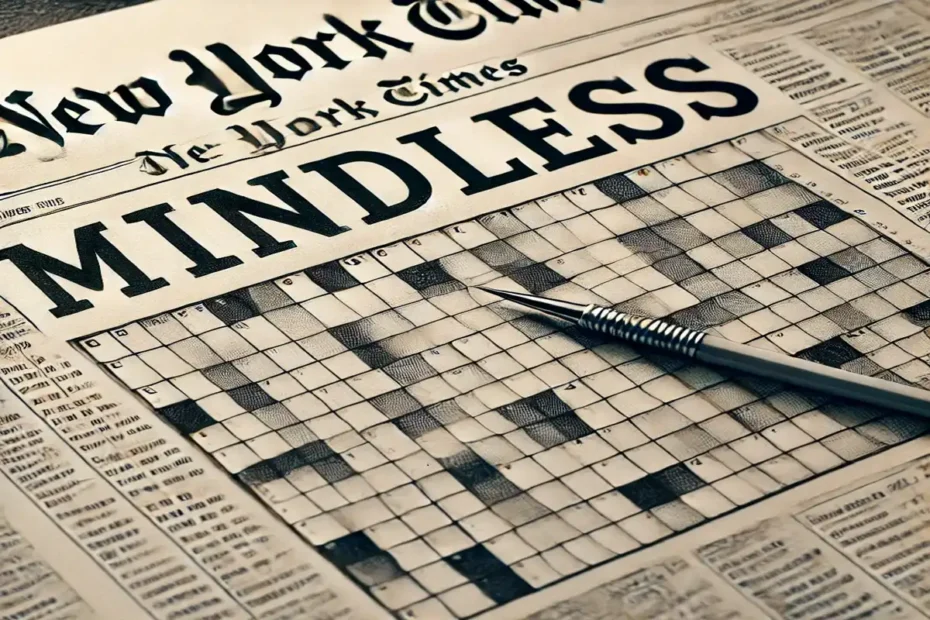The New York Times (NYT) crossword puzzle is one of the most popular and respected word games in the world. Known for its clever and challenging clues, it keeps millions of solvers engaged daily. One recurring clue that often appears in NYT crossword puzzles is “mindless NYT crossword.” While the phrase “mindless” may suggest simplicity or a lack of thought, solving its crossword clue requires intelligence, a strong vocabulary, and the ability to recognize word patterns.
This article delves into the meaning and usage of “mindless NYT crossword,” common answers associated with it, the cognitive benefits of crossword solving, and why the NYT crossword continues to be a favorite among enthusiasts.
Common Answers to the “Mindless NYT Crossword” Clue
Crossword puzzles rely on synonyms, wordplay, and cultural references to create intriguing clues. Over the years, “mindless NYT crossword” has been used as a crossword clue with several possible answers, depending on the length and complexity of the puzzle. Below are some of the most common solutions:
1. INANE
The word “inane” means lacking sense, silly, or foolish. It has been a popular answer to the “mindless NYT crossword” clue in NYT crossword puzzles. For instance, in a December 22, 2020, puzzle, “INANE” was the correct answer. This term is frequently used in crosswords because it is short, vowel-heavy, and synonymous with thoughtlessness.
2. ROTE
“Rote” refers to mechanical or habitual repetition without real understanding or thought. This answer appeared in the NYT crossword on January 16, 2021. Since learning by rote means memorizing without comprehension, it aligns perfectly with the definition of “mindless NYT crossword.”
3. ASININE
Meaning extremely foolish or stupid, “asinine” is another answer that occasionally appears in NYT crosswords. It is a longer word but still fits when the puzzle’s structure allows for an eight-letter solution.
4. VACUOUS
“Vacuous” describes something lacking intelligence, depth, or meaning. It serves as a sophisticated synonym for “mindless NYT crossword” and has been seen in past crossword puzzles.
5. OTHER POSSIBLE ANSWERS
Other words that have been used for the “mindless NYT crossword” clue include:
- “DENSE”
- “DAFT”
- “EMPTY”
- “STUPID”
Solvers must consider word length and crossing letters to determine the correct answer.
Why Solving “Mindless NYT Crossword” Clues Is Not Mindless
While the term “mindless” suggests a lack of thinking, solving a crossword puzzle clue with this phrase is far from thoughtless. It requires logical reasoning, vocabulary knowledge, and pattern recognition. Here’s why solving these clues is intellectually stimulating:
1. Expanding Vocabulary
Solving crosswords helps improve language skills by exposing solvers to new words and their meanings. A clue like “mindless NYT crossword” may introduce words such as “vacuous” or “asinine” to a solver unfamiliar with them.
2. Enhancing Problem-Solving Skills
Crosswords require solvers to analyze clues, consider multiple possibilities, and fit words into a grid. This strengthens cognitive flexibility and analytical thinking.
3. Improving Memory and Recall
The process of recalling words and their meanings exercises the brain. Research suggests that regularly engaging in word puzzles may delay cognitive decline and enhance memory retention.
The Popularity of the NYT Crossword
The NYT crossword has maintained its status as one of the most prestigious word puzzles since its inception in 1942. It attracts solvers of all levels, from beginners to experts. Here are some reasons why the NYT crossword remains a favorite:
1. Gradual Difficulty Progression
One of the unique aspects of the NYT crossword is its increasing difficulty throughout the week. Monday puzzles are relatively easy, making them accessible for beginners, while Saturday puzzles are notoriously challenging. This structure allows solvers to gradually improve their skills.
2. High-Quality Clues
The crossword is known for its clever wordplay, puns, and cultural references. Even common words like “mindless NYT crossword” are presented in thought-provoking ways.
3. Engaging Themes
NYT crossword puzzles often have themes that add an extra layer of fun and complexity. Some puzzles revolve around word patterns, while others incorporate pop culture, history, or literature.
4. Community and Competition
Many solvers enjoy the social aspect of crosswords, whether discussing clues with friends or competing in crossword tournaments. The NYT crossword has a dedicated following, with forums and blogs where enthusiasts share solving strategies.
Tips for Solving “Mindless NYT Crossword” and Other Clues
If you’re struggling with a clue like “mindless NYT crossword,” here are some strategies to help you find the answer:
1. Consider Synonyms
Think of words that mean “mindless NYT crossword.” Common synonyms include “inane,” “dull,” “empty,” and “vacuous.” If one doesn’t fit, try another.
2. Check the Number of Letters
The number of letters in the answer is a key factor. If the puzzle requires a five-letter word, “inane” might be correct. If it requires an eight-letter word, “asinine” could be the answer.
3. Use Crossing Words
Look at the letters from intersecting words. If a word crosses through the answer you’re trying to solve, use those letters as clues to narrow down the possibilities.
4. Think About Context
NYT crossword clues can be tricky. Sometimes, “mindless NYT crossword” might hint at a figurative meaning rather than a literal one. Consider different angles before settling on an answer.
5. Practice Regularly
The more puzzles you solve, the better you become. Over time, you’ll recognize commonly used words and develop an instinct for solving even the trickiest clues.
Conclusion
The “mindless NYT crossword” clue is a great example of how even a simple word can lead to complex and intriguing solutions. Answers like “inane,” “rote,” “asinine,” and “vacuous” challenge solvers to think critically and expand their vocabulary.
Beyond solving individual clues, engaging with the NYT crossword provides cognitive benefits, from improving memory to enhancing problem-solving skills. The puzzle’s enduring popularity is a testament to its high-quality construction, clever wordplay, and ability to engage solvers of all levels.
So the next time you see “mindless NYT crossword” as a clue in the NYT crossword, remember—solving it is anything but mindless!
For more informational articles, please visit nytupdates.com.
